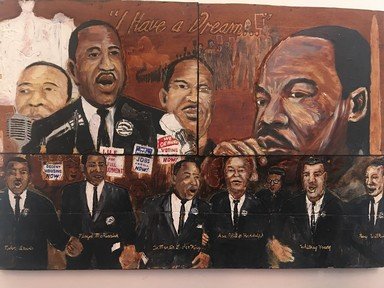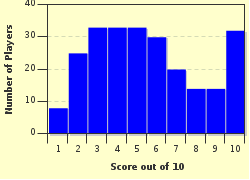Quiz Answer Key and Fun Facts
1. By 1965 attention turned to the Black economic issue. Instead of being confined to the South this problem was widespread throughout America. The Watts ghetto riots of 1965 shocked King, who had become involved in the North in order to broaden his influence. With the Watts ghetto in mind, in which northern city did King begin a campaign in 1966 aimed at tackling Black economic issues as well as preventing riots?
2. King's methods of gradual change seemed outdated and many younger Blacks demanded greater pace. For this reason more radical organisations began to become more popular. Groups such as CORE and the SNCC now began to advocate a violent black backlash to the white oppressors, an ideal which many young people could relate to. Stokely Carmichael, the new radical leader of the SNCC, coined the phrase "Black Power". In which 1966 demonstration did he famously use this phrase?
3. Stokely Carmichael was the new, radical, charismatic leader of the SNCC. However, which other man, leader of CORE from 1966, became one of the great advocators of "Black Power" alongside Carmichael?
4. During the entire Black civil rights campaign, many of the great changes came about not because of the efforts of its leaders, but by events which were not directly linked to it. One such event was the Vietnam War, which had an extremely negative affect on the movement. Which of the following was NOT one of the negative affects of the war on the Black civil rights movement?
5. One Black radical organisation which had existed since 1934 was the Nation of Islam. They believed in black supremacy and the segregation of Blacks and whites. Who was the founder of the Nation of Islam as well as its leader until his death in 1975?
6. Malcolm X is arguably one of the most famous leaders of the civil rights movement and his influence was great in life and death. After his bitter split from the Nation of Islam, which organisation did Malcolm X establish?
7. The phrase "Black Power" was first used by Stokely Carmichael. However, what did this phrase mean? It was viewed in different ways by different people. Carmichael saw it as unity between all Black people and McKissick saw it as economic power. Which man, a leader of the NAACP, denounced the slogan as racist?
8. The Black Panthers who were established in 1966 and aimed to increase Black nationalism and to help the black working class struggle. Which two famous Black leaders were the founders of this organisation?
9. From Truman's Executive orders to Johnson's great society, it can be argued that much was done by U.S Presidents to help the black civil rights campaign. Which President's actions included creating the CEEO (intended to ensure equal employment opportunities) as well as appointing 40 Black Americans to top posts in the government?
10. Martin Luther King Jr had been one of the most effective leaders in the civil rights campaign in the mid 20th century, proving to be extremely successful at gaining support for other peoples campaigns as well a leading his own. He was assassinated in 1968 by James Earl Ray. On what date did this occur?
Source: Author
doublemm
This quiz was reviewed by FunTrivia editor
bloomsby before going online.
Any errors found in FunTrivia content are routinely corrected through our feedback system.


